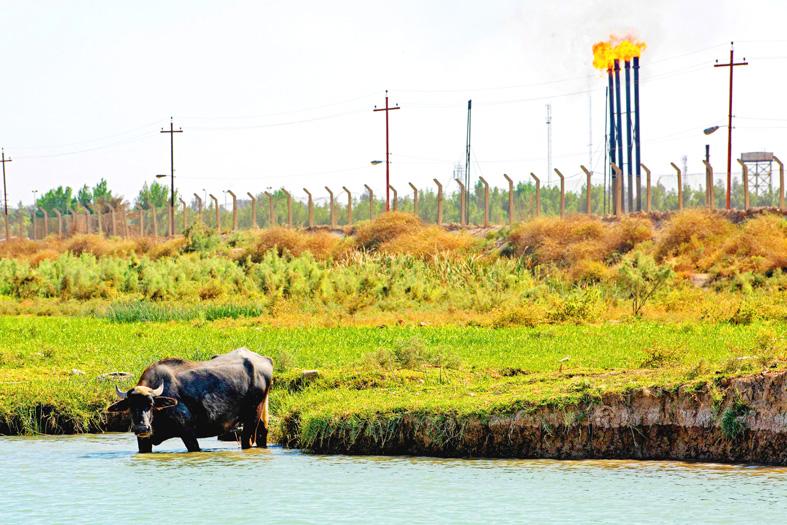Oil pared its weekly loss as Saudi Arabia cranked up prices for its global crude exports and the US demurred on a potential release of oil from the strategic reserve.
West Texas Intermediate (WTI) shaved its weekly loss to 2.75 percent, rising sharply late in the session on Friday, after Saudi Arabia raised the official selling price of all the nation’s crudes to buyers around the globe.
WTI for December delivery on Friday rose 3.12 percent to US$81.27 a barrel, while Brent crude for December delivery rose 2.73 percent to US$82.74 a barrel, declining 1.17 percent from a week earlier.

Photo: AFP
Saudi Arabia boosted its prices just days after refusing to concede to US pressure to pump more oil.
With the OPEC+ cartel unanimously agreeing to stick to its plans, attention now turns to whether US President Joe Biden will respond.
“The key focus for the market right now remains the US’ response to the OPEC+ meeting yesterday,” said Rebecca Babin, senior energy trader at CIBC Private Wealth Management.
The increase in Saudi Arabian Oil Co prices suggests Saudi Arabia sees demand still improving, particularly in Asia where a resurgence in COVID-19 cases seeded doubt about the recovery’s strength, she added.
Oil has rallied to multiyear highs this year as major economies, including the US and China, recover from the COVID-19 pandemic, with BP PLC estimating global demand has rebounded above the pre-COVID-19 level of 100 million barrels a day.
A global energy crunch due to coal and natural gas shortages has exacerbated the tightness in the oil market and increased inflationary pressures in the US, prompting the Biden administration to seek ways to lower fuel costs.
Earlier on Friday, US Secretary of Energy Jennifer Granholm said that Washington is looking at a potential release from the Strategic Petroleum Reserve. Japan said it is in close contact with the US and the International Energy Agency as pressure from consumers grows.
For months, Biden has led calls for OPEC+ to add more barrels to tame high oil prices. The US was seeking an increase of as much as double the amount that was agreed, and has been among key consumers that previously raised the prospect of tapping their own strategic reserves if the alliance did not cooperate.
“Oil is not the problem,” Saudi Arabian Minister of Energy Prince Abdulaziz bin Salman said after the OPEC+ meeting on Thursday, citing natural gas shortages. “The problem is the energy complex is going through havoc and hell.”
Additional reporting by staff writer

China’s Huawei Technologies Co (華為) plans to start mass-producing its most advanced artificial intelligence (AI) chip in the first quarter of next year, even as it struggles to make enough chips due to US restrictions, two people familiar with the matter said. The telecoms conglomerate has sent samples of the Ascend 910C — its newest chip, meant to rival those made by US chipmaker Nvidia Corp — to some technology firms and started taking orders, the sources told Reuters. The 910C is being made by top Chinese contract chipmaker Semiconductor Manufacturing International Corp (SMIC, 中芯) on its N+2 process, but a lack

NVIDIA PLATFORM: Hon Hai’s Mexican facility is to begin production early next year and a Taiwan site is to enter production next month, Nvidia wrote on its blog Hon Hai Precision Industry Co (鴻海精密), the world’s biggest electronics manufacturer, yesterday said it is expanding production capacity of artificial intelligence (AI) servers based on Nvidia Corp’s Blackwell chips in Taiwan, the US and Mexico to cope with rising demand. Hon Hai’s new AI-enabled factories are to use Nvidia’s Omnivores platform to create 3D digital twins to plan and simulate automated production lines at a factory in Hsinchu, the company said in a statement. Nvidia’s Omnivores platform is for developing industrial AI simulation applications and helps bring facilities online faster. Hon Hai’s Mexican facility is to begin production early next year and the

AVIATION BOOM: CAL is to renew its passenger and cargo fleets starting next year on record profits as aviation continues to return to pre-pandemic levels China Airlines Ltd (CAL, 中華航空) yesterday said it is optimistic about next year’s business outlook, as the airline continues to renew its fleet on expectations that global passenger traffic would maintain steady growth and air cargo demand would remain strong. From next year to 2028, the airline is to welcome a new Boeing Co 787 fleet — 18 787-9 and six 787-10 passenger aircraft — to cover regional and medium to long-haul destinations, CAL chairman Hsieh Shih-chien (謝世謙) said at an investors’ conference in Taipei. The airline would also continue to introduce Airbus SE 321neo passenger planes and Boeing 777F cargo jets,

Who would not want a social media audience that grows without new content? During the three years she paused production of her short do-it-yourself (DIY) farmer’s lifestyle videos, Chinese vlogger Li Ziqi (李子柒), 34, has seen her YouTube subscribers increase to 20.2 million from about 14 million. While YouTube is banned in China, her fan base there — although not the size of YouTube’s MrBeast, who has 330 million subscribers — is close to 100 million across the country’s social media platforms Douyin (抖音), Sina Weibo (新浪微博) and Xiaohongshu (小紅書). When Li finally released new videos last week — ending what has